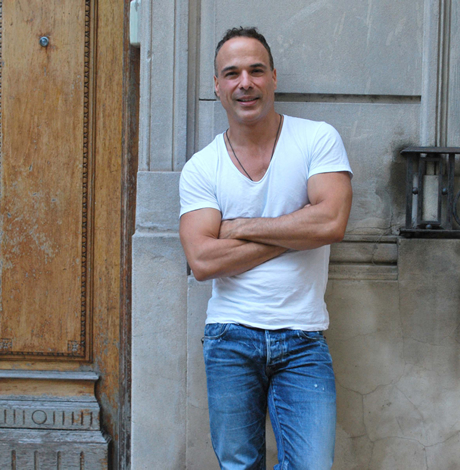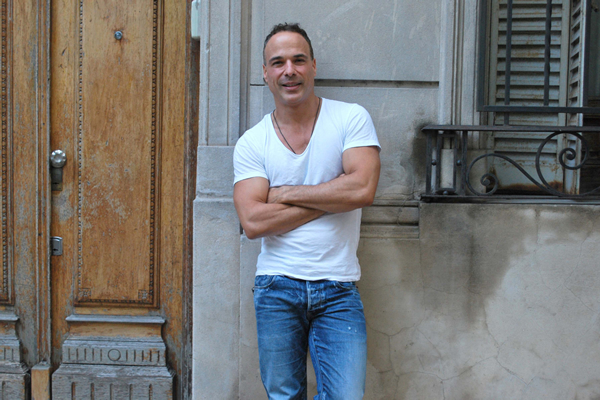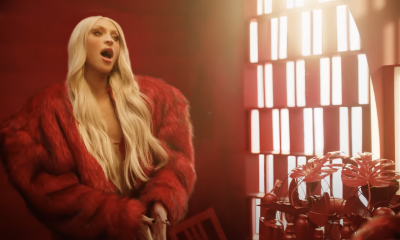Theater
Cirque du Soleil director reflects on zig-zagging career
Out director served as creative director for Madonna’s 2012 Super Bowl halftime show


Michel Laprise says ‘KURIOS’ is unlike any other show Cirque du Soleil has ever done. (Photo by Martin Girard, courtesy Cirque du Soleil)
Cirque du Soleil
‘KURIOS — Cabinet of Curiosities’
July 21-Sept. 18
Lerner Town Square at Tysons II
8025 Galleria Dr., Tysons, Va.
Tickets starting at $39
Michel Laprise loves big projects. The charming and whip-smart out director served as creative director for Madonna’s 2012 Super Bowl halftime show and directed her “MDNA Tour.” More recent credits include writer/director of Cirque du Soleil’s latest touring show “KURIOS — Cabinet of Curiosities” soon to set up its distinctive Grand Chapiteau (Big Top) in Tysons Corner, Va.
Inspired by the Victorian era’s surge of invention and creativity and imbued with a “French steam punk” aesthetic, “Kurios” premiered in Montréal in April 2014 and is Cirque du Soleil’s 35th production. Like Cirque du Soleil’s other shows, “Kurios” reinvents circus by combining the basics — tent, clowns and acrobats — with sophistication and the artistic elements of theater.
Recently, Laprise shared thoughts via phone from Montréal where he’s based about “Kurios,” Cirque du Soleil and Madonna, whom he calls M.
For a lot of people, Cirque du Soleil’s innovative aspects have become familiar. Is the pressure to remain cutting edge massive?
Yes, but it’s a pressure we put on ourselves. I hear people say, “I’ve seen Cirque once. I don’t need to see it again.” For us it’s a mission to constantly reinvent ourselves. “Kurios” is different from other shows. The characters are real people in real clothes. The set itself is a laboratory that someone inhabits and not the abstract magical place like in our other shows.
What led you to staging big productions? Did it happen by accident?
Well nothing happens by accident, only by passion. I’m a group person, so the bigger the project, the more people you get to play with. I’ve never looked at the obstacles, only the destination, which is to make people happy and storytelling. It’s like a big surprise party for a lot of people. When I joined Cirque 15 years ago to do casting, I styled auditions to be an intense two-day mini-workshop. Because most of the acrobats were not speaking English or French, I used my intuition to touch their talent and did my best to bring it out. Over the years, the artists who were cast encouraged me to direct. Eventually I told Cirque co-founder Guy Laliberté that I wanted to direct. Of course he wasn’t yet ready to give me a $30 million dollar project like “Kurios,” but he knew I came from theater and was a professional director so he made me special events designer. And eventually he allowed me to conceive and direct my show which was a longtime ambition of mine.
What’s the inspiration behind “Kurios”?
My dream was to do a show where a character accesses a parallel world and brings poetry and imagination back to earth. We live in a world where we can do so much. I can ring Tokyo for free on Internet right now. Yet it’s a very complex time of scarcity for many people. I want to help people believe that everything is possible, because I think it is. And I want them to feel joy. The show is set in the latter half of the 19th century, a time of invention and innovation. Lots was happening — the railroad, telegraph, gramophone, electricity. Suddenly invisible energy was stimulating people’s imaginations. Not accidentally, it was also the golden age of magic and illusionists. Magicians were the rock stars of the era.
Does being gay make you a better director?
I’ve always been gay so I don’t know any other way. But I do believe that going through the process of coming out to self and family and friends gives you a sense of compassion and allows you to appreciate diversity. And that I think makes for a better director. Of course I’m generalizing. There are assholes in every community. Within Cirque, same-sex couples are respected and celebrated. So being gay here isn’t an issue.
Why especially should LGBT people come to see “Kurios?”
Critics and fans say this is Cirque’s best touring show in 10 years. It’s more theatrical than most of Cirque’s other productions and what’s more, there’s a rainbow and disco ball in the show. I don’t want to spoil the surprise of when they appear. There’s also a lot of love and inclusiveness in the show. The planets were well aligned when we created this show. And of course the acrobats and what they can do with their bodies is amazing. To reach their level skill, they begin training at age 5 and live a strictly disciplined lifestyle. They eat tiny bites of food throughout the day. Stretch a couple hours before every performance.
I’d be doing our readers a disservice if I didn’t ask the next question.
You want to know whether or not I’m single?
No. I’d like to hear about working with Madonna.
Before working with Madonna in 2012, I presented my ideas to her manager. He liked them so he took me to her. She appeared in the room. I told her my thoughts and she was smiling as I spoke. Then she asked me to listen to “Give Me All Your Luvin’” the first track of her then-new album “MDNA.” M’s hands were shaking a little bit as we listened. So I thought that if after 30 years she’s still nervous to show new work, then this is somebody who really cares about what they’re doing. I knew then that I wanted to work her. For the first week of rehearsals for “MDNA,” M hurt her ankle and broke her little finger. I asked to slow down pace. She said, “No Michel.” That’s the job. It’s like going to war with her. She thinks like an acrobat. Her work ethic is incredible. She’s also very demanding but it’s nothing I wouldn’t expect from a woman of that level. She never yelled at me. The only time she raised her voice during rehearsal was when the schedule wasn’t allowing her to see her kids. Despite the pressure on her, she was calm and focused with brilliant sense of humor. She teases me about my (French Canadian) accent which is less strong now than it was. I don’t do a lot of pop music shows, but I’d definitely like to work with her again. We stay in touch. She sent me flowers on my birthday.
And are you single?
I am. But that might be changing. Some romance may be in the works, but that’s all I’ll say.
Theater
Out actor Kevin Cahoon on starring role in ‘Chez Joey’
Arena production adapted from Broadway classic ‘Pal Joey’

‘Chez Joey’
Through March 15
Arena Stage
1101 Sixth St., S.W.
Tickets start at $93
Arenastage.org
As Melvin Snyder in the new musical “Chez Joey,” out actor Kevin Cahoon plays a showbiz society columnist who goes by the name Mrs. Knickerbocker. He functions as a sort of liaison between café society and Chicago’s Black jazz scene circa 1940s. It’s a fun part replete with varied insights, music, and dance.
“Chez Joey” is adapted from the Broadway classic “Pal Joey” by Richard Rodgers and Lorenz Hart. It’s inspired by John O’Hara’s stories based on the exploits of a small-time nightclub singer published in The New Yorker.
A warm and humorous man, Cahoon loves his work. At just six, he began his career as a rodeo clown in Houston. He won the Star Search teen division at 13 singing songs like “Some People” from “Gypsy.” He studied theater at New York University and soon after graduating set to work playing sidekicks and comedic roles.
Over the years, Cahoon has played numerous queer parts in stage productions including “Hedwig and the Angry Inch,” “La Cage aux Folles,” “Rocky Horror” as well as Peanut in “Shucked,” and George the keyboardist in “The Wedding Singer,” “a sort of unicorn of its time,” says Cahoon.
Co-directed by Tony Goldwyn and the great Savion Glover, “Chez Joey” is a terrific and fun show filled with loads of talent. Its relevant new book is by Richard Lagravenese.
On a recent Monday off from work, Cahoon shared some thoughts on past and current happenings.
WASHINGTON BLADE: Is there a through line from Kevin, the six-year-old rodeo clown, to who we see now at Arena Stage?
KEVIN CAHOON: Anytime I want to land a joke in a theater piece it goes back to that rodeo clown. It doesn’t matter if it’s Arena’s intimate Kreeger Theatre or the big rodeo at the huge Houston Astrodome.
I was in the middle stadium and there was an announcer — a scene partner really. And we were doing a back and forth in hopes of getting laughs. At that young age I was trying to understand what it takes to get laughs. It’s all about timing. Every line.
BLADE: Originally, your part in “Chez Joey” Melvin was Melba who sings “Zip,” a clever woman reporter’s song. It was sort of a star feature, where they could just pop in a star in the run of “Pal Joey.”
CAHOON: That’s right. And in former versions it was played by Martha Plimpton and before her Elaine Stritch. For “Chez Joey,” we switched gender and storyline.
We attempted to do “Zip” up until two days before we had an audience at Arena. Unexpectedly they cut “Zip” and replaced it with a fun number called “I Like to Recognize the Tune,” a song more connected to the story.
BLADE: Wow. You must be a quick study.
CAHOON: Well, we’re working with a great band.
BLADE: You’ve played a lot of queer parts. Any thoughts on queer representation?
CAHOON: Oh yes, definitely. And I’ve been very lucky that I’ve had the chance to portray these characters and introduce them to the rest of the world. I feel honored.
After originating Edna, the hyena on Broadway in “The Lion King,” I left that to do “Hedwig and the Angry Inch” as standby for John Cameron Mitchell, doing one show a week for him.
Everyone thought I was crazy to leave the biggest musical of our time with a personal contract and getting paid more money that I’d ever made to get $400 a week at the downtown Jane Street Theatre in a dicey neighborhood.
At the time, I really felt like I was with cool kids. I guess I was. And I never regretted it.
BLADE: When you play new parts, do you create new backstories for the role?
CAHOON: Every single time! For Melvin, I suggested a line about chorus boys on Lakeshore Drive.
BLADE: What’s up next for Kevin Cahoon?
CAHOON: I’m about to do the New York Theatre Workshop Gala; I’ve been doing it for nine years in a row. It’s a huge job. I’ll also be producing the “Cats: The Jellicle Ball” opening on Broadway this spring; it’s a queer-centric uptown vogue ball with gay actor André de Shields reprising his role as “Old Deuteronomy.”
BLADE: There’s a huge amount of talent onstage in “Chez Joey.”
CAHOON: There is. I’m sharing a dressing room with Myles Frost who plays Joey. He won accolades for playing Michael Jackson on Broadway. We’ve become great friends. He’s a miracle to watch on stage. And Awa [Sal Secka], a D.C. local, is great. Every night the audience falls head over heels for her. When this show goes to New York, Awa will, no doubt, be a giant star.
BLADE: Do you think “Chez Joey” might be Broadway bound?
CAHOON: I have a good feeling it is. I’ve done shows out of town that have high hopes and pedigree, but don’t necessarily make it. “Chez Joey” is a small production, it’s funny, and audiences seem to love it.
Theater
José Zayas brings ‘The House of Bernarda Alba’ to GALA Hispanic Theatre
Gay Spanish playwright Federico García Lorca wrote masterpiece before 1936 execution

‘The House of Bernarda Alba’
Through March 1
GALA Hispanic Theatre
3333 14th St., N.W.
$27-$52
Galatheatre.org
In Federico García Lorca’s “The House of Bernarda Alba,” now at GALA Hispanic Theatre in Columbia Heights, an impossibly oppressive domestic situation serves, in short, as an allegory for the repressive, patriarchal, and fascist atmosphere of 1930s Spain
The gay playwright completed his final and arguably best work in 1936, just months before he was executed by a right-wing firing squad. “Bernarda Alba” is set in the same year, sometime during a hot summer in rural Andalusia, the heart of “España profunda” (the deep Spain), where traditions are deeply rooted and mores seldom challenged.
At Bernarda’s house, the atmosphere, already stifling, is about to get worse.
On the day of her second husband’s funeral, Bernarda Alba (superbly played by Luz Nicolás), a sixtyish woman accustomed to calling the shots, gathers her five unmarried daughters (ages ranging from 20 to 39) and matter-of-factly explain what’s to happen next.
She says, “Through the eight years of mourning not a breeze shall enter this house. Consider the doors and windows as sealed with bricks. That’s how it was in my father’s house and my grandfather’s. Meanwhile, you can embroider your trousseaux.”
It’s not an altogether sunny plan. While Angustias (María del Mar Rodríguez), Bernarda’s daughter from her first marriage and heiress to a fortune, is betrothed to a much younger catch, Pepe el Romano, who never appears on stage, the remaining four stand little chance of finding suitable matches. Not only are they dowry-less, but no men, eligible or otherwise, are admitted into their mother’s house.
Lorca is a literary hero known for his mastery of both lyrical poetry and visceral drama; still, “Bernarda Alba’s” plotline might suit a telenovela. Despotic mother heads a house of adult daughters. Said daughters are churning with passions and jealousies. When sneaky Martirio (Giselle Gonzáles) steals the photo of Angustias’s fiancé all heck kicks off. Lots of infighting and high drama ensue. There’s even a batty grandmother (Alicia Kaplan) in the wings for bleak comic relief.
At GALA, the modern classic is lovingly staged by José Zayas. The New York-based out director has assembled a committed cast and creative team who’ve manifested an extraordinarily timely 90-minute production performed in Spanish with English subtitles easily ready seen on multiple screens.
In Lorca’s stage directions, he describes the set as an inner room in Bernarda’s house; it’s bright white with thick walls. At GALA, scenic designer Grisele Gonzáles continues the one-color theme with bright red walls and floor and closed doors. There are no props.
In the airless room, women sit on straight back chairs sewing. They think of men, still. Two are fixated on their oldest siter’s hunky betrothed. Only Magdelena (Anna Malavé), the one sister who truly mourns their dead father, has given up on marriage entirely.
The severity of the place is alleviated by men’s distant voices, Koki Lortkipanidze’s original music, movement (stir crazy sisters scratching walls), and even a precisely executed beatdown choreographed by Lorraine Ressegger-Slone.
In a short yet telling scene, Bernarda’s youngest daughter Adela (María Coral) proves she will serve as the rebellion to Bernarda’s dictatorship. Reluctant to mourn, Adela admires her reflection. She has traded her black togs for a seafoam green party dress. It’s a dreamily lit moment (compliments of lighting designer Hailey Laroe.)
But there’s no mistaking who’s in charge. Dressed in unflattering widow weeds, her face locked in a disapproving sneer, Bernarda rules with an iron fist; and despite ramrod posture, she uses a cane (though mostly as a weapon during one of her frequent rages.)
Bernarda’s countenance softens only when sharing a bit of gossip with Poncia, her longtime servant convincingly played by Evelyn Rosario Vega.
Nicolás has appeared in “Bernarda Alba” before, first as daughter Martirio in Madrid, and recently as the mother in an English language production at Carnegie Melon University in Pittsburgh. And now in D.C. where her Bernarda is dictatorial, prone to violence, and scarily pro-patriarchy.
Words and phrases echo throughout Lorca’s play, all likely to signal a tightening oppression: “mourning,” “my house,” “honor,” and finally “silence.”
As a queer artist sympathetic to left wing causes, Lorca knew of what he wrote. He understood the provinces, the dangers of tyranny, and the dimming of democracy. Early in Spain’s Civil War, Lorca was dragged to the the woods and murdered by Franco’s thugs. Presumably buried in a mass grave, his remains have never been found.
Theater
Magic is happening for Round House’s out stage manager
Carrie Edick talks long hours, intricacies of ‘Nothing Up My Sleeve’

‘Nothing Up My Sleeve’
Through March 15
Round House Theatre
4545 East-West Highway
Bethesda, Md. 20814
Tickets start at $50
Roundhousetheatre.org
Magic is happening for out stage manager Carrie Edick.
Working on Round House Theatre’s production of “Nothing Up My Sleeve,” Edick quickly learned the ways of magicians, their tricks, and all about the code of honor among those who are privy to their secrets.
The trick-filled, one-man show starring master illusionist Dendy and staged by celebrated director Aaron Posner, is part exciting magic act and part deeply personal journey. The new work promises “captivating storytelling, audience interaction, jaw-dropping tricks, and mind-bending surprises.”
Early in rehearsals, there was talk of signing a non-disclosure agreement (NDA) for production assistants. It didn’t happen, and it wasn’t necessary, explains Edick, 26. “By not having an NDA, Dendy shows a lot of trust in us, and that makes me want to keep the secrets even more.
“Magic is Dendy’s livelihood. He’s sharing a lot and trusting a lot; in return we do the best we can to support him and a large part of that includes keeping his secrets.”
As a production assistant (think assistant stage manager), Edick strives to make things move as smoothly as possible. While she acknowledges perfection is impossible and theater is about storytelling, her pursuit of exactness involves countless checklists and triple checks, again and again. Six day weeks and long hours are common. Stage managers are the first to arrive and last to leave.
This season has been a lot about learning, adds Edick. With “The Inheritance” at Round House (a 22-week long contract), she learned how to do a show in rep which meant changing from Part One to Part Two very quickly; “In Clay” at Signature Theatre introduced her to pottery; and now with “Nothing Up My Sleeve,” she’s undergoing a crash course in magic.
She compares her career to a never-ending education: “Stage managers possess a broad skillset and that makes us that much more malleable and ready to attack the next project. With some productions it hurts my heart a little bit to let it go, but usually I’m ready for something new.”
For Edick, theater is community. (Growing up in Maryland, she was a shy kid whose parents signed her up for theater classes.) Now that community is the DMV theater scene and she considers Round House her artistic home. It’s where she works in different capacities, and it’s the venue in which she and actor/playwright Olivia Luzquinos chose to be married in 2024.
Edick came out in middle school around the time of her bat mitzvah. It’s also around the same time she began stage managing. Throughout high school she was the resident stage manager for student productions, and also successfully participated in county and statewide stage management competitions which led to a scholarship at the University of Maryland, Baltimore County (UMBC) where she focused on technical theater studies.
Edick has always been clear about what she wants. At an early age she mapped out a theater trajectory. Her first professional gig was “Tuesdays with Morrie” at Theatre J in 2021. She’s worked consistently ever since.
Stage managing pays the bills but her resume also includes directing and intimacy choreography (a creative and technical process for creating physical and emotional intimacy on stage). She names Pulitzer Prize winning lesbian playwright Paula Vogel among her favorite artists, and places intimacy choreographing Vogel’s “How I learned to Drive” high on the artistic bucket list.
“To me that play is heightened art that has to do with a lot of triggering content that can be made very beautiful while being built to make you feel uncomfortable; it’s what I love about theater.”
For now, “Nothing Up My Sleeve” keeps Edick more than busy: “For one magic trick, we have to set up 100 needles.”
Ultimately, she says “For stage managers, the show should stay the same each night. What changes are audiences and the energy they bring.”




















